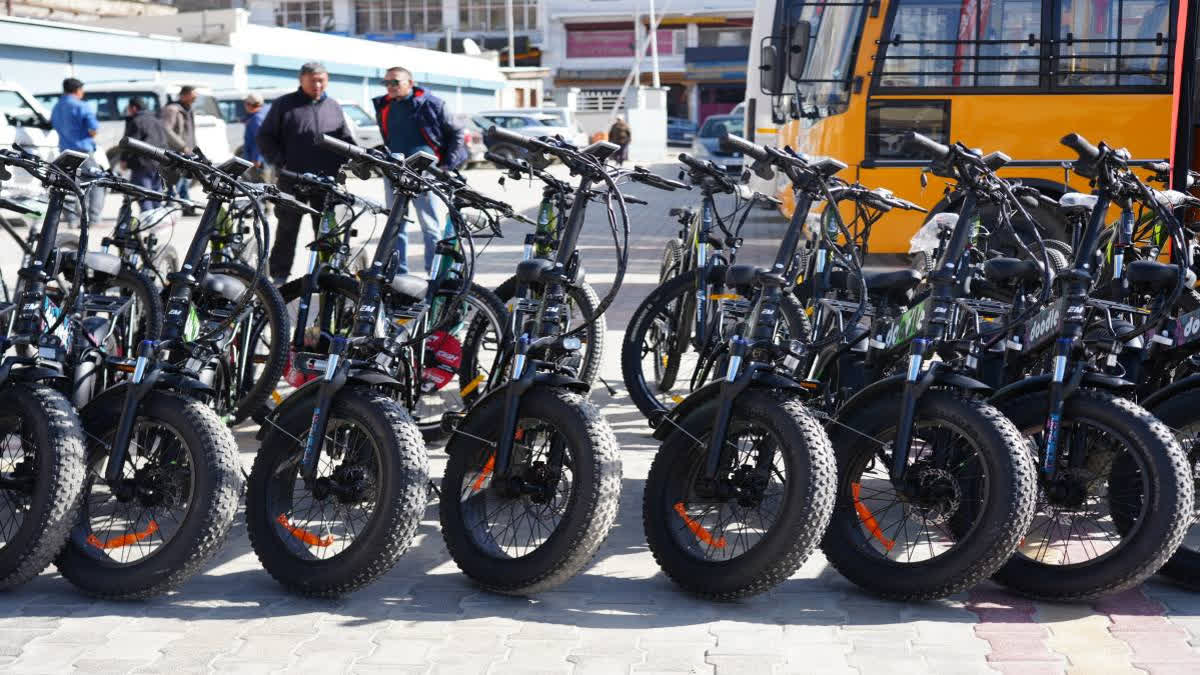Leh: Ladakh's journey toward carbon neutrality is gaining momentum as the region embraces sustainable mobility initiatives. From increased e-cycle subsidies to a growing fleet of e-buses and e-cars, Ladakh is steadily transitioning to eco-friendly transportation alternatives.
Adv. Tashi Gyaltson, Chief Executive Councillor, Tsering Angchuk Deputy Chairman of LAHDC Leh, Santosh Sukhadeve, Deputy Commissioner, Leh, and Dr. Tundup Namgail, Deputy Director, District Motor Garages, Leh along with other district officers, inaugurated this initiative by flagging off a fleet of e-cycles from the District Motor Garages in Leh on Tuesday. The Chief Executive Councillor also distributed e-cycles to beneficiaries under the LAHDC Subsidy Scheme. Besides, two school buses were also flagged off.
Adv. Tashi Gyaltson spoke on Ladakh’s journey toward becoming a carbon-neutral region. "When Ladakh was granted Union Territory status, Prime Minister (Narendra) Modi expressed his vision of making it a model UT that is also carbon-neutral," Gyaltson said.
"Our focus is to introduce environmentally friendly practices and projects to achieve this goal. Several sustainable, eco-friendly programs are already in place across Ladakh, and e-cycles are one of our efforts. The idea was first discussed by the Deputy Chairman last year, with the vision that if each resident of Leh used a cycle even for one day, we could make a significant impact on reducing our carbon footprint. However, we do not have a massive industry in Ladakh which affects the environment," added Gyaltson.
He further said, "Last year, we launched the e-cycle program with limited subsidies and interest was less among the people. This year, we increased the subsidy and raised awareness to help people see the health and environmental benefits of cycling. This has attracted interest, with many Ladakhis, including officers, pledging to use cycles for their commute when possible. By choosing to cycle, you are contributing to the global commitment to combat climate change and keep our environment clean."
"This gradual shift toward e-cycles and sustainable practices is helping us move closer to our vision of a clean, carbon-neutral Ladakh," he concluded.
Tsering Angchuk, on his part, said, "The introduction of e-cycles in Ladakh, aimed at promoting environmental sustainability, improving public health, and reducing traffic congestion in Leh city. Given the rough terrain here, we prioritised high-quality e-cycles that are durable, have a long battery life, and make a meaningful contribution to the environment."
"To encourage their adoption, we've offered higher subsidies for cycles priced above a lakh and a smaller subsidy for more affordable models," Angchuk said.
"We invited interested buyers to register through a Google form, and the response has been encouraging, with over 100 people signing up," Angchuk added.
Dr Tundup Namgail, Deputy Director of District Motor Garages in Leh, outlined Ladakh's push toward sustainable mobility, focusing on three key areas.
"First, we're promoting personal mobility through e-cycles. This year, we have increased their availability due to public demand. We aim to distribute approximately 150-200 e-cycles this year itself. If more people opt for e-cycles, it could reduce vehicle congestion in Leh, particularly in the summer," said Dr Namgail.
Dr Namgail highlighted the impact of e-buses, stating, "Ladakh now has 19 e-buses—5 in Kargil and 14 in Leh—serving various routes operating through SIDCO. These buses are popular with the public as they are not only comfortable and fuel-efficient but also environmentally friendly, aligning with Ladakh’s fragile ecology."
Further, he discussed the introduction of 10 e-cars for director-level officers as an alternative to diesel vehicles, citing cost efficiency.
"A full fuel tank for a conventional car costs around ₹3,000-4,000, whereas e-cars cost only ₹10 per unit of electricity. The government is providing solar charging stations in various blocks, routes, and highways. Also, a lot of charging infrastructure is coming up in Ladakh. These DC fast chargers allow a 75% charge in just 35-45 minutes, covering up to 400 km on a full charge," he concluded.



